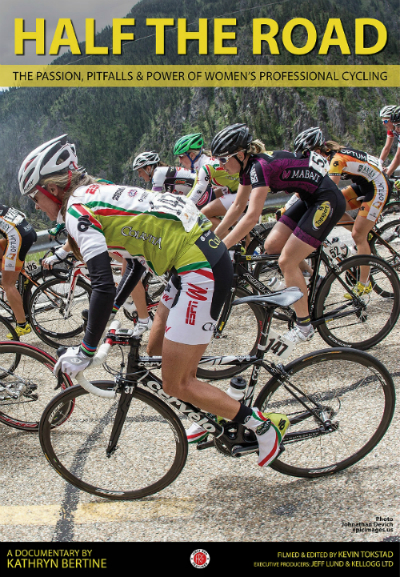
Written by Amanda Rodriguez
Half the Road is professional athlete and filmmaker Kathryn Bertine‘s revelatory, inspiring documentary that exposes the rampant gender inequality in professional cycling.
[youtube_sc url=”http://youtu.be/nsKumPrwaQE”]
Half the Road takes us into the homes and lives of professional female cyclists who thrive in their sport, some of whom must work other jobs in order to make ends meet, who must sleep on couches or floors when they travel to race, who hide injuries to maintain a tenuous spot on team rosters due to archaic age regulations, who spend valuable time and energy fighting unfair UCI rulings and bureaucracy, or even one woman who buys tea kettles with her prize winnings because there’s little else she can afford with such a pittance. We see the faces of these elite athletes, like time trialist Emma Pooley, criterium rider and Ph.D holder Nichole Wangsgard, four-time Ironman triathlete gold medalist Chrissie Wellington, and two-time Olympic gold medalist Kristin Armstrong (no relation to Lance Armstrong), and we learn in a straightforward manner about their struggle for gender parity in their sport.

The documentary’s director, Kathryn Bertine, intimately knows the limitations that stifle female cyclists’ potential because she is a professional cyclist herself. Bertine says:
“As a sports journalist and professional athlete, I knew we had to show the truth about gender equality in sports which is simply a mirror for gender equality in society. As much as everyone wants to believe that Title IX (sports equality law in the USA) has leveled the playing field in sports, the reality is there is still a long way to go. The good news is that cyclists and fans are pushing for change, and at the heart of this movement is a raw, pure, uplifting love of sport specific only to the struggle and triumph of female athletes.”

As an amateur cyclist, I was ecstatic to review Half the Road, especially because the obstacles female professional cyclists face (pathetic prize winnings along with the lack of pay equity, sponsorships, media coverage, recognition, and equal opportunity to compete in events) has long galled me. To finally have a documentary that gives the women most affected by this gender discrimination a platform to show their outrage, their passion for cycling, and their absolute right to “half the road” is crucial for letting the world know this problem exists while (hopefully) acting as a catalyst to evolve the governing body for cycling, the Union Cycliste Internationale (UCI) to accept gender parity as a necessity and the norm.
These athletes, these women, deserve better. I urge you to watch this film and add your newfound knowledge and outrage to this growing movement that demands female professional cyclists be afforded the same rights, privileges, and opportunities that men are given. Because how will we know what heights a woman is capable of achieving if we never give her the chance? Plus, watching Half the Road gives us the treat of seeing all those ladies’ amazing quad muscles in action.


Kathryn was also the key driver that managed to get the Women a stage in the Tour de France